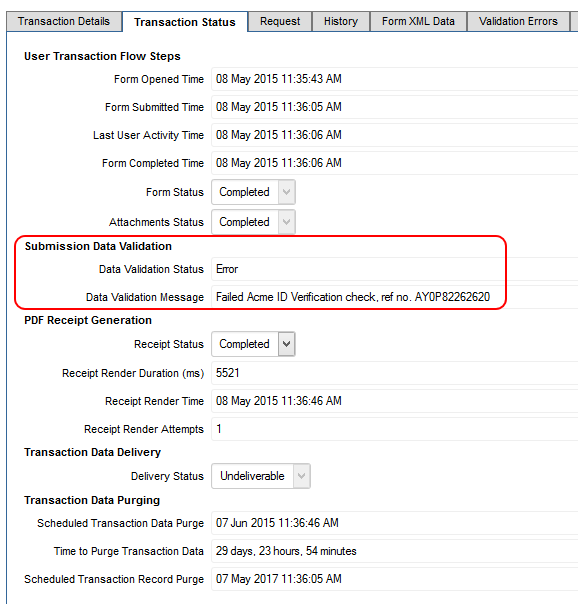Submission Data Validator
The Submission Data Validator is called when a completed form is submitted. This service can be used to verify that the submitted XML is valid and not an attempted fraudulent transaction.
A Submission Data Validator service may perform business rules validation on the server using Groovy script interrogating the submitted XML. If the service finds validation errors, it can return a list of validation errors which are stored against the transaction, and is visible using the Validation Errors tab. If the service returns one or more validation error strings, the transaction's Data Validation status is set to Error.

Transactions with an Error data validation status aren't delivered using the normal delivery channel. If a form Validation Delivery channel is defined then the transaction is delivered using this channel; otherwise. it is marked as Undeliverable and made ready for submission data purging.
Service Invoke Parameters
Parameters are not nullable except where otherwise indicated.
| Parameter | Description |
|---|---|
svcDef | SvcDefA service definition value object. |
txn | TxnA transaction record value object. |
request | HttpServletRequestNullable. A HTTP servlet request. |
user | UserNullable. An authenticated user. |
Error Handling
If an error occurs, the system catches the error and logs it to the Journey Manager database error log. The user should not be aware that any error has occurred.
info
Any changes made by the service to the database are persisted with the transaction. It is up to the service to undo any changes it has made.
Templates
Service
import com.avoka.core.groovy.GroovyLogger as logger
import com.avoka.tm.svc.*
import com.avoka.tm.vo.*
import javax.servlet.http.*
class FluentSubmissionDataValidator {
/*
* Perform submission data validator service
*
* return: list of data validation error messages
*/
List<string> invoke(SvcDef svcDef, Txn txn, HttpServletRequest request, User user) {
// TODO: perform validation logic, return any data validation errors in error list
List errors = new ArrayList<string>()
return errors
}
}
Unit Test
import com.avoka.core.groovy.GroovyLogger as logger
import com.avoka.tm.query.*
import com.avoka.tm.svc.*
import com.avoka.tm.test.*
import com.avoka.tm.util.*
import com.avoka.tm.vo.*
import org.junit.Test
class UnitTest extends AbstractJUnitTest {
/*
* Perform service unit test
*
* throws exception if unit test fails
*/
@Test
void testStatusSubmitted() throws Exception {
String xmlData = testParams['Test XML Data']
Txn txn = new MockVoBuilder().createTxnSubmittedWithXml(xmlData)
MockRequest request = new MockRequest()
Map params = [
"svcDef": svcDef,
"txn": txn,
"request": request,
"user": null
]
List errors = (List) new ServiceInvoker(svcDef).invoke(params)
txn = new TxnQuery()
.setId(txn.id)
.withPropertyMap()
.firstValue()
logger.info txn
// Test any business logic performed
assert txn.formStatus == Txn.FORM_SUBMITTED
assert errors.size() == 0
}
}